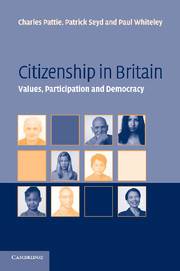Book contents
- Frontmatter
- Contents
- List of Figures
- List of Tables
- Acknowledgements
- Preface
- 1 What is Citizenship?
- I Understanding Citizenship
- 2 Civic Beliefs and Citizenship
- 3 Civic Behaviour and Citizenship: Macro Politics
- 4 Civic Behaviour and Citizenship: Micro Politics
- II Modelling Citizenship
- III The Consequences of Citizenship
- Appendices
- Bibliography
- Index
3 - Civic Behaviour and Citizenship: Macro Politics
Published online by Cambridge University Press: 22 September 2009
- Frontmatter
- Contents
- List of Figures
- List of Tables
- Acknowledgements
- Preface
- 1 What is Citizenship?
- I Understanding Citizenship
- 2 Civic Beliefs and Citizenship
- 3 Civic Behaviour and Citizenship: Macro Politics
- 4 Civic Behaviour and Citizenship: Micro Politics
- II Modelling Citizenship
- III The Consequences of Citizenship
- Appendices
- Bibliography
- Index
Summary
In addition to measuring people's civic beliefs, the Citizen Audit is also a census of people's participation in Britain at the beginning of the twenty-first century. It tells us what they are getting up to. It maps out the broad range of activities, both formal and informal, that people engage in outside of their families and beyond their work, and for which they do not get paid. It details their political activities, their associational life, and the way they behave when dealing with the problems arising in their daily lives over their children's education, their own health, or their working conditions. We begin this chapter by examining people's political behaviour. We then consider their associational activities. Then in the following chapter we discuss people's attempts to influence day-to-day practical matters, such as schooling, medical care or work conditions, which we describe as micro level political behaviour.
Repertoires of political behaviour
In order to learn more about the range of political activities in which people get involved, we asked our respondents whether, over the previous twelve months, they had engaged in any of a listed seventeen activities while attempting to ‘influence rules, laws or policies’. Our list was devised after extensive piloting of the survey in which people's perceptions of politics were closely observed, and the final questionnaire reflected this preliminary analysis. The list is deliberately wide-ranging and covers activities which are not captured by studies that concentrate upon the more traditional forms of politics.
- Type
- Chapter
- Information
- Citizenship in BritainValues, Participation and Democracy, pp. 76 - 109Publisher: Cambridge University PressPrint publication year: 2004



